BLACK TEST CAR (1962) • THE BLACK REPORT (1963)
Two car manufacturers spy on each other to try to find out details and prices of a new sports car each is about to launch.
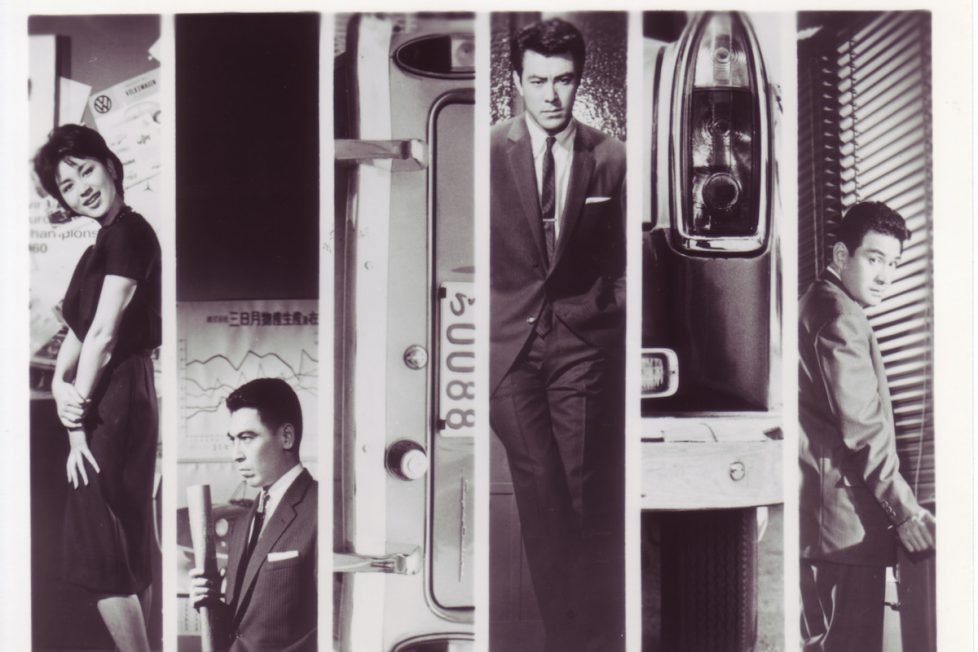
Two car manufacturers spy on each other to try to find out details and prices of a new sports car each is about to launch.


Arrow Video’s re-release of Black Test Car and The Black Report puts a welcome spotlight on the work of Yasuzo Masumura (1924-1986), a prolific and original Japanese director who, even if he’s no Kurosawa or Ozu, deserves to be better known beyond his native land.
These early Masumura films show him as an iconoclast in a very 1960s way; satirising human weaknesses, asking questions about the trust the Japanese placed in their governmental and corporate institutions… and doing so in a hard-boiled no-nonsense style with an effective visual language. There are, indeed, hints of noir, although it’s probably fanciful to imagine that the reference to “black” in these films’ titles refers to that. The term “noir” was not in wide usage at the time.
Black Test Car / Kuro no tesuto ka is the more interesting of the two, not so hemmed in as Black Report by the requirements of a genre. A non-stop and sometimes funny film which turns dark toward the end, it focuses on the Tiger car company’s attempt to bring to market Japan’s first sports car, and the efforts of its rival Yamato to both sabotage Tiger’s project and release its own vehicle.
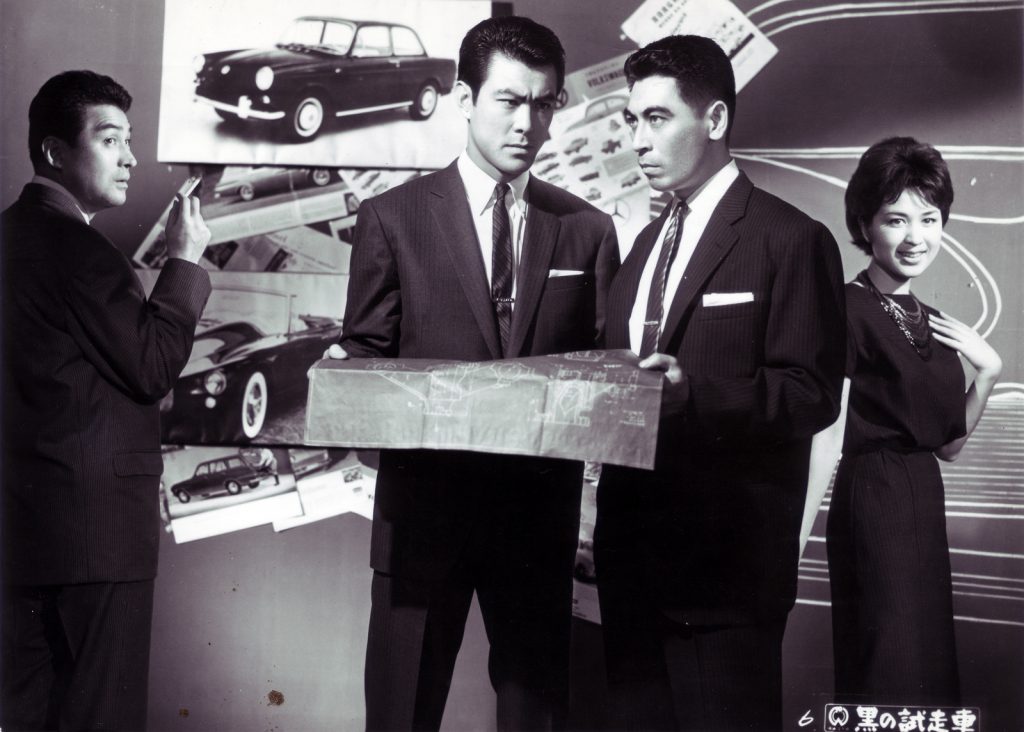
That the two cars, when they finally go on sale, turn out to be more or less identical is, of course, an ironic comment on the way corporate competition doesn’t necessarily lead to greater consumer choice. But the eventual clash of ideas isn’t so much between the companies as between two Tiger employees—zealous Onoda (Hideo Takamatsu) and the less certain Asahina (Jiro Tamiya). “Why don’t you take off this business suit and change into a khaki uniform?”, Asahina demands when Onoda finally goes too far in the service of the company.
Onoda has, in effect, become just as bad as Mr Mawatari (Ichiro Sugai), the boss of the Yamato company spoken of with mixed fear and horror as having been an army officer during the Japanese occupation of Manchuria. Post-war Japanese distaste for militarism could equally well be applied to industry, Masumura—who had previously portrayed crazed corporate competition among confectionery makers in Giants and Toys / Kyojin to gangu (1958)—seems to be subversively saying.
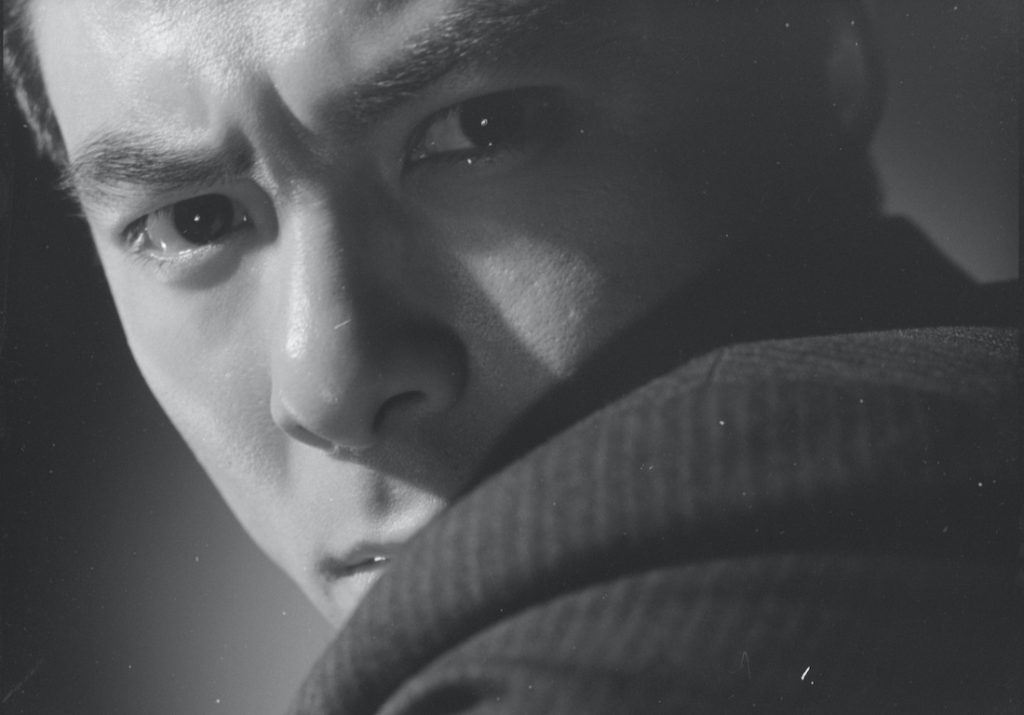
Interestingly, the trailer for Black Test Car is almost entirely concerned with the moral aspect, rather than the movie’s more caper elements. Up to this point, however, Black Test Car is highly plot-driven, with almost every scene delivering a new development and little time given over to characterisation.
Yet the people aren’t nearly as one-dimensional as this might imply. We can understand their perspectives and, in some cases, their conflicting feelings. Most are corrupt or have an angle of some sort (“all of them become scumbags at one point or another”, as the critic Jonathan Rosenbaum puts it in the excellent mini-documentary on Arrow’s Blu-ray), but there’s also some redemption at the end.
And they’re brought alive by consistently strong performances, too—most notable among them Sugai as the smug Mr Mawatari and Takamatsu as Onoda, the committed young executive dedicated to his company who always has a scheme and seems confident… but is secretly worried things won’t work out. Junko Kano, meanwhile, is just one of the fine female performers who appear in both Black Report and Black Test Car: the two movies are superficially male-dominated, but the women are absolutely key to the way they develop.
JAPAN | 1962 | 95 MINUTES | 2.35:1 | BLACK & WHITE | JAPANESE

After Black Test Car the Daiei studio released a whole string of “black” movies that it called “salaryman thrillers”, some of them—like Black Super Express / Kuro no chotokkyu (1964)—directed by Masumura, though they’re not sequels as such. The Black Report / Kuro no hokokusho, sometimes known in English as Black Statement Book, had many cast and behind-the-camera personnel in common with Black Test Car and is stylistically similar, fast-moving, and plot-driven.
In both films, there are a few moments of genuine drama (for example when Asahina’s girlfriend seduces Mr Mawatari in Black Test Car, or during the trial at the centre of Black Report), but for the most part, Masumura is more interested in telling a story—primarily through dialogue, with occasional use of documents—than in showing one. The few fights and other physical activities are unconvincing.
This isn’t as successful in Black Report as in Black Test Car. While in Black Test Car there are some digressions away from the main storyline, Black Report concentrates more single-mindedly on the murder investigation and subsequent trial. As a result, the need for a twist every few minutes makes them so convoluted they’re sometimes difficult to follow. (What exactly is the latest theory on the missing ¥23M, you find yourself wondering, and by the time you’ve figured it out it’s moved on…)
But again there’s a persuasive cynicism— the pursuit of justice in the prosecutors’ department seems to be more about the pursuit of careers, and pillars of Japanese society are revealed as devious and greedy. “To the public, he was the president of Fujiyama Foods. To me, he was a money-mad womaniser,” says a murdered tycoon’s son.
Black Report spreads its attention across a wider range of characters than Black Test Car, with the result being we don’t get to know many of them terribly well, but the cast is just as impressive; among the stand-outs is Shigeru Koyoma as Hitomi, the shifty and supercilious main suspect in the murder.
Masumura’s use of the camera is just as striking in this second movie, too. He prefers static takes, often shooting past foregrounded people or objects to the subject—an effect that, along with some expressionist touches, emphasises the claustrophobia of Japanese organisations and society, in which individuals have comparatively little freedom to move. His habit of shooting medium close-up in widescreen, cutting off the top of actor’s heads, reinforces this hemmed-in feel.
So, even if brief running times and rapidly-progressing narratives don’t allow much scope for deep exploration of Masumura’s characters, their humanity (including their flaws) is always believable. They seem to act from real motivations, and the way they clash with the norms and institutions of their society is one we can still relate to.
And maybe that, coupled with some wryly-observed humour and an urgent, punchy directorial style, is why Black Test Car (and to a lesser extent Black Report) remains so watchable today.
JAPAN | 1963 | 94 MINUTES | 2.35:1 | BLACK & WHITE | JAPANESE

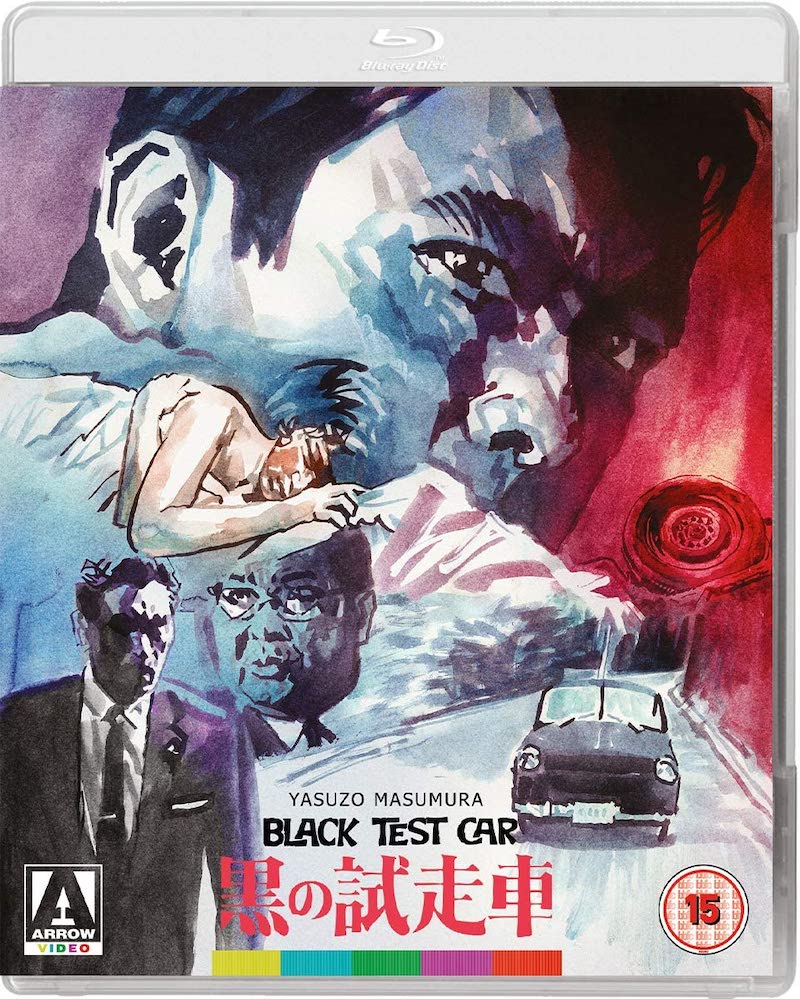
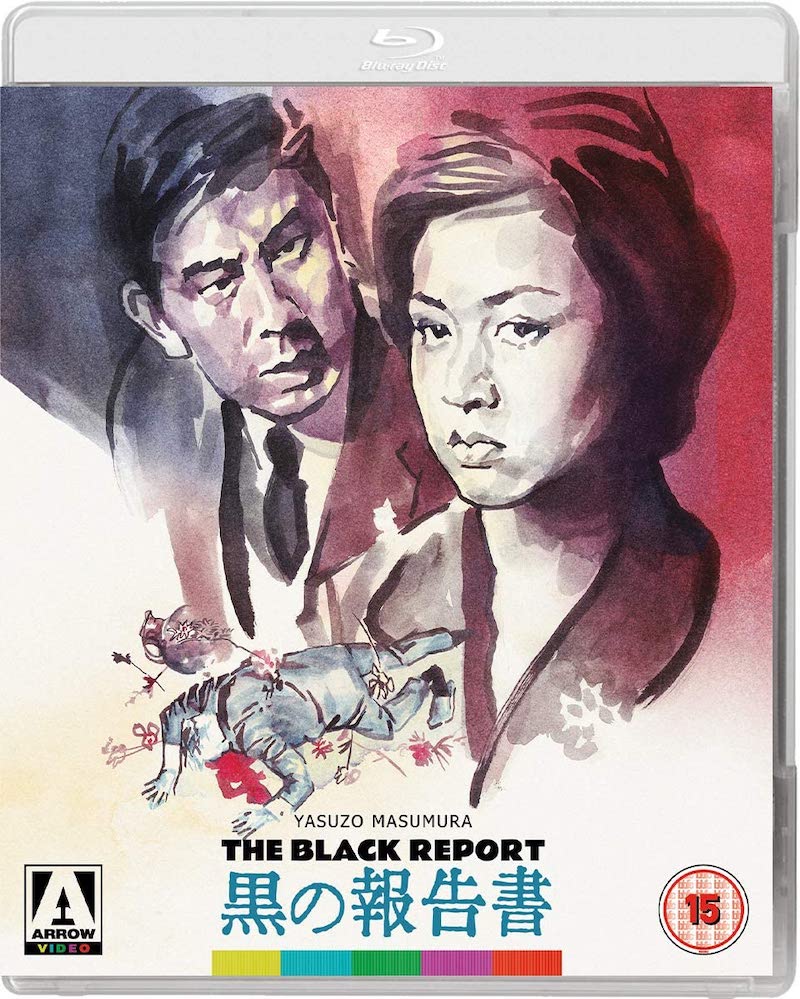
The transfer of Masumura’s original black-and-white footage to Arrow Video’s discs is mostly very good, with Black Test Car’s picture being perhaps slightly better of the two. The mono audio is clear enough for Sei Ikeno’s excellent scores to come through—ironic, sometimes reminiscent of horror soundtracks, and creative in their use of instruments.

director: Yasuzô Masumura.
writers: Kazuo Funahashi, Yoshihiro Ishimatsu & Sueyuki Kajiyama (Black Test Car) • Yoshihiro Ishimatsu & Yasuzô Masumura (Black Report)
starring: Jirô Tamiya, Junko Kanô & Hideo Takamatsu (Black Test Car) • Ken Utsui, Junko Kanô, Hideo Takamatsu, Shigeru Kôyama & Eitarô Ozawa (Black Report).
